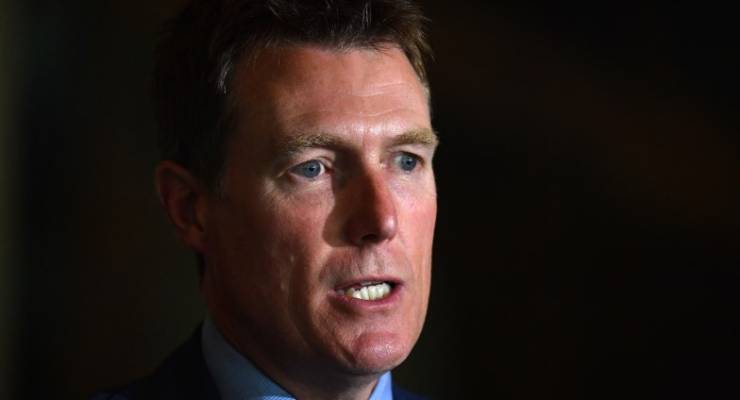
The learning experience continues at News Corp when it comes to government attacks on free speech.
Having discovered that the national security laws it championed in recent years could be used to intimidate its own journalists, the company now realises, with a shock, that they can also be directed at its political allies and even prominent Liberals.
Who’d have thought giving bureaucrats ever more draconian powers had a downside?
Thus the fury of The Australian that Tony Abbott had been harassed by the Attorney-General’s Department (AGD) about his role at a far-right CPAC-wannabe conference in August, as was an organiser of the conference, Andrew Cooper. The harassment was by the same outfit that dispatched a threatening letter to the Nine media company — chaired by Liberal elder Peter Costello — in May after it embarrassed One Nation.
Cooper’s conference might have been a merry gathering of loons, but it was perfectly legal. Yet the demands the AGD made of Cooper were frightening: it wanted an extensive set of documents about the organisation and conduct of the conference, including private correspondence with speakers.
This is a bureaucrat’s version of “papers please”, an arrogant exercise of the power to stop anyone engaged in lawful activity that is no business of the government and demand that they identify and account for themselves.
And it’s now clear that the foreign influence laws under which the demands were made are so broadly drafted that not merely is a media outlet that uses footage sourced from a foreign broadcaster potentially caught, but a former politician speaking at a conference with offshore links.
Cooper correctly compared the activities of the AGD to the East German Stasi — a theme picked up by The Australian, which labelled its efforts “Bureaucrats’ ‘Stasiland’”.
Crikey has been describing Australia as a police state for some time, but we’re happy that that particular penny has also dropped at the Oz, which did so much to facilitate the state’s creation.
Attorney-General Christian Porter thinks the problem isn’t the laws that the AGD are implementing, but the zealotry with which they’re doing so, and says he’ll force his department to impose “common sense”.
Except, using the law to harass people is “common sense” at the AGD.
As Crikey pointed out back in August, the AGD has a long track record of undermining civil liberties in Australia under both sides of politics. And it is Porter and his bureaucrats who are currently trying to hide the prosecution of Witness K and Bernard Collaery from public scrutiny, who are seeking to jail Collaery using secret documents he and his lawyers will not be permitted to see, and who have stretched out the trial as long as possible in order to inflict financial damage on Collaery and pressure K into pleading guilty.
No wonder these bureaucrats also want to intimidate the media and people organising public debate.
For years, the bureaucrats in the AGD have been the legal brains of a government that has reduced Australia to a police state, where those who embarrass the ruling party are harassed, raided and prosecuted, while its friends and donors are protected and rewarded. That was until it drafted a law so loose that friend and foe alike are caught in its grip.
Welcome to Stasiland Down Under.








‘common sense’ – a deliciously vague term, a grey area which would have legal eagles salivating. Is there a plausible legal definition?
What may appear common sense to one collective (eg: climate deniers) is farcical to another (environmentalists).
Mr Justice Bullingham in Rumpole of the Bailey was very good at it. Mayhap the Fletcher Christian has some Mortimer on his bedside table.
Security laws. Like a cute pet baby crocodile – all right while they fit in your fish tank, eh Rupert?
Porter’s “Brown Jocks”.
“common sense” is Christian(!) Porter expecting that the goons know that known friends of the Liberal Party are to be exempted from such laws.
In bygone times, they used to keep undesireables out via the language test, so they have to play it a bit differently now.
Rupert Murdoch’s media feeling the pinch from our draconian laws? Pardon my Schadenfreude.